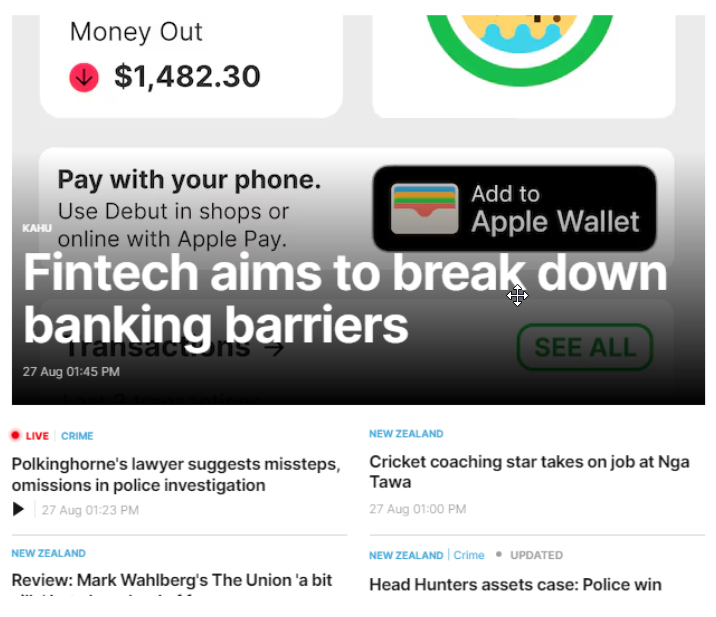The Journey to Becoming a New Zealand Registered Bank
Impact PR client, Debut – a financial services provider, made nationwide headlines following the release of details that it was planning to launch an application to become a locally-owned registered bank with the Reserve Bank of New Zealand.
As one of the top public relations agencies in Auckland, New Zealand Impact PR was on hand to coordinate the media opportunity – leveraging it in local media for their client. Positive media coverage was seen in a wide range of high-reach titles including the New Zealand Herald, Newstalk ZB and Stuff as well as numerous tech and business titles.
See more below and read the full story:

NZ Fintech Debut Set to Launch Application to Become Registered Bank
New Zealand’s banking landscape is poised for a shift as a local fintech company embarks on becoming the nation’s first locally owned bank, specifically designed for an open banking framework and powered by artificial intelligence (AI).
Debut, a financial services company, has initiated discussions with the Reserve Bank of New Zealand and is now preparing its application to achieve registered bank status.
Currently, New Zealand is home to 27 registered banks, yet only five are locally owned. The most recent of these was registered more than a decade ago.
A recent Commerce Commission report on the banking sector in New Zealand raised significant concerns regarding the lack of competition. The report revealed that the market is heavily dominated by the four major Australian-owned banks, which are highly profitable yet do not compete vigorously for customers. This has resulted in higher costs, fewer choices, and poorer service for consumers compared to countries with established open banking systems.
Open banking is a system where banks permit third-party providers, such as fintech companies, to access customers’ financial data, with their consent. This model aims to give consumers greater control over their financial information and offers more personalised products and services.
The Government has endorsed the Commission’s recommendation to introduce open banking, thereby enhancing consumer access to next-generation banking services and fostering greater competition within the sector.
Although not yet a registered bank, Debut has already launched a variety of new financial services through its mobile app.
The Commission’s report also highlighted that some groups, particularly Māori, are especially vulnerable to financial exclusion under the current banking system. Debut’s representatives state that their technology is designed to minimise geographic and other barriers to access, enabling customers to set up an account online without needing to visit a physical branch. Key services like a digital Mastercard debit card, Apple Pay, and Google Pay can be accessed within minutes.
Debut’s offerings also include allowing customers to generate multiple virtual debit cards on-demand, controlling the types of transactions that can be made. These virtual cards can be deleted at any time, preventing recurring charges from difficult-to-cancel subscriptions and offering additional protection when shopping on unfamiliar websites.
Experts believe that open banking will facilitate the entry of service providers with more streamlined operating models, leading to lower fees and improved returns for consumers.
In an industry first, Debut applies a universal interest rate of 5.10% per annum to both transaction and savings accounts. There are no penalties, lock-ups, or minimum deposit requirements, ensuring all customers benefit equally. Additionally, no foreign exchange fees are applied to purchases made while travelling abroad or on international e-commerce sites.
Artificial intelligence and automation are also expected to play a crucial role in fraud detection and helping consumers manage their finances. Debut has introduced new AI-driven budgeting tools that automatically categorise transactions with 91% accuracy.

Debut co-founder Sulabh Sharma asserts that the introduction of open banking will be transformative for the industry and for how New Zealanders manage their finances. He notes that while New Zealand has lagged behind other countries in adopting open banking, the introduction of the Consumer and Product Data Bill marks a significant milestone towards more comprehensive data sharing.
“The Bill will extend beyond the banking sector to include industries like energy, telecommunications, and insurance, creating a more integrated and comprehensive data-sharing ecosystem,” Sharma says.
“The primary objective of open banking should be to empower customers with control over their data, driving innovation and fostering competition. The focus should be on delivering genuine value to customers, not merely fulfilling regulatory requirements.
“We have modelled Debut’s offerings on highly successful neobanking services that have emerged in markets like the UK, Brazil, and Australia, following changes to their regulatory environments.
“By building this technology from the ground up with this framework in mind, we can integrate a new suite of financial services and work towards our goal of putting $1 billion back in Kiwi pockets.
“Consumer interest in alternative banking services is strong. We had over 7,000 Kiwis on the waiting list for early access to our app, and since our launch, customer numbers have been doubling each month,” he adds.
Sharma also mentions that Debut has formed partnerships with local banking institutions and investment firms, ensuring that all customer funds are held in trust for their protection. The company offers low-risk investment add-ons designed to mirror the Official Cash Rate, catering to customers who may not be confident in traditional investment products.
He further reveals that the company is developing lending products tailored to individual needs, regardless of financial ambition or life stage.
Debut is not a registered bank under the Banking (Prudential Supervision) Act. This is about our future intentions. Investments with us are not supervised currently by the Reserve Bank of New Zealand.
If you have questions about public relations, contact us today. – we would love to help.
